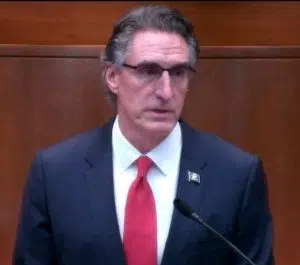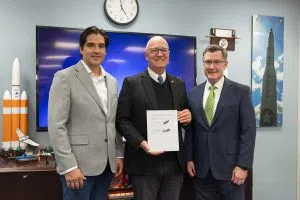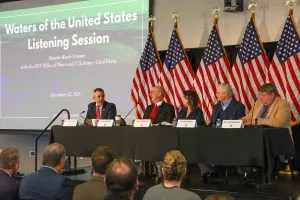
(KNOX) – Gov. Doug Burgum presented his final executive budget address to the 69th Legislative Assembly, proposing a $95 million package to improve housing affordability, accessibility and stability during the 2025-27 biennium, and an additional $54 million for workforce-related programs including child care support, to continue addressing the state’s workforce shortage – all with no new taxes.
Burgum delivered the address to a joint session of the Legislature on the last day of its organizational session. Lawmakers will convene in regular session on Jan. 7.
“We are proposing a strategy-driven budget that addresses our No. 1 barrier to economic growth, our workforce challenge. This includes investments that support workforce including in housing, infrastructure, child care, education, research and economic development, and other priorities to build upon the progress we’ve made in growing and diversifying the economy,” Burgum said.
The executive budget recommends increasing the general fund from $6.1 billion to $6.5 billion, which would still be $343 million below the record high general fund budget for the 2013-15 biennium. Federal and special funds, formula-driven increases and inflationary costs push the total proposed budget to just under $19.6 billion, a slight decrease from the current two-year budget.
The governor highlighted North Dakota’s incredibly strong financial position, noting that even with the record level of income tax relief provided last session, reserve funds are full and revenues for the current biennium ending June 30, 2025, are 11%, or $392 million, ahead of forecast. Between the State Investment Board and the Board of University and School Lands (Land Board), the state’s assets under management in various funds have doubled to $32.6 billion since 2017. The Land Board also oversees an estimated $2.46 billion in mineral value.
“This is a time of abundance in North Dakota. And as you, the members of the 69th Legislative Assembly, convene, you are facing perhaps the greatest levels of opportunity ever presented to any prior assembly in our state’s 135-year history,” Burgum said.
North Dakota had a record population estimate in 2023 and also had the highest net in-migration rate in 2023 among all states, according to a recent report from Consumer Affairs, Burgum noted, adding, “People are choosing to move here because of our abundant opportunities, low cost of living and high quality of life.”
North Dakota’s labor force has grown by over 9,200 workers since 2017, a 2.2% increase, while the number of unemployed individuals has dropped by 49.3%, or 7,390 people. With a nation-leading labor force participation rate of 68.8% and the nation’s third-lowest unemployment rate, the state continues to demonstrate strong workforce engagement, but work remains to address workforce challenges, Burgum said.
The budget includes multiple proposals to continue the workforce momentum from last session, including:
$95 million to address housing availability, affordability and stability through a variety of programs.
$19 million for child care to build on the historic $66 million child care package approved last session.
$22.5 million for the successful Regional Workforce Impact Program, which has funded 111 projects including 54 child care projects.
Continued funding for the Find the Good Life workforce attraction campaign.
In addition, the budget proposed increased investments in behavioral health and addiction services, K-12 and higher education, unmanned aircraft systems, tourism destination development, economic development and research, infrastructure including roads, water projects, airports and corrections, including funding for the planning, design and initial construction of a new 600-resident Missouri River Correctional Center and funding to complete the much-needed Heart River Women’s Transformational Center in Mandan.
This was Burgum’s 10th time as governor addressing a joint session of the Legislature, having previously delivered three budget addresses, four State of the State addresses to regular sessions and two to special sessions. His last day in office will be Dec. 14.










